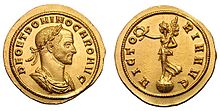- Carus
-
Carus 48th Emperor of the Roman Empire 
Aureus of Emperor Carus.Reign 282–283 Full name Marcus Numerius Carus (from birth to accession);
Caesar Marcus Aurelius Carus Augustus (as emperor)Born c. 224 Birthplace Narbo, Gallia Narbonensis Died July or August 283 (aged 59) Place of death Beyond the River Tigris, Mesopotamia Predecessor Probus Successor Carinus Offspring Carinus, Numerian, Aurelia Paulina Carus (Latin: Marcus Aurelius Carus Augustus;[1][2] c. 224[3] – July or August 283), was Roman Emperor from 282 to 283. During his short reign, Carus fought the Germanic tribes and Sarmatians along the Danube frontier with success. During his campaign against the Sassanid Empire he sacked their capital Ctesiphon, but died shortly thereafter. He was succeeded by his sons Carinus and Numerian; creating a dynasty which, though short-lived, granted further stability to a resurgent empire.
Contents
Biography
Carus, whose name before the accession may have been Marcus Numerius Carus,[4] was born, probably, at Narbo (modern Narbonne) in Gaul,[5][6] but was educated at Rome.[7] He was a senator,[8] and had filled various civil and military posts before he was appointed prefect of the Praetorian Guard by the emperor Probus in 282.[9] After the murder of Probus at Sirmium, Carus was proclaimed emperor by the soldiers.[10] Although Carus severely avenged the death of Probus, he was himself suspected of having been an accessory to the deed.[11] He does not seem to have returned to Rome after his accession, but contented himself with an announcement of the fact to the Senate.[12]
Bestowing the title of Caesar upon his sons Carinus and Numerian,[13][14] he left Carinus in charge of the western portion of the empire, and took Numerian with him on the expedition against the Persians which had been contemplated by Probus.[15] Having defeated the Quadi and Sarmatians on the Danube,[16] for which he was given the title Germanicus Maximus,[17] Carus proceeded through Thrace and Asia Minor, annexed Mesopotamia, pressed on to Seleucia and Ctesiphon, and marched his soldiers beyond the Tigris.[18] The Sassanid King Bahram II, limited by internal opposition, could not effectively defend his territory.[19] For his victories, which avenged all the previous defeats suffered by the Romans against the Sassanids, Carus received the title of Persicus Maximus.[20]
Carus' hopes of further conquest were cut short by his death. One day, after a violent storm, it was announced that he was dead.[21] His death was variously attributed to disease,[22] the effects of lightning,[23] or a wound received in a campaign against the Persians.[24] The facts that he was leading a victorious campaign, and that his son Numerian succeeded him without opposition, suggest that his death may have been due to natural causes.[25]
Sourcess
Primary Sources
- Aurelius Victor, Epitome de Caesaribus
- Eutropius, Breviarium ab urbe condita
- Historia Augusta, Life of Carus, Carinus and Numerian
- Joannes Zonaras, Compendium of History extract: Zonaras: Alexander Severus to Diocletian: 222–284
Secondary Sources
- Leadbetter, William, "Carus (282–283 A.D.)", DIR
- Jones, A.H.M., Martindale, J.R. The Prosopography of the Later Roman Empire, Vol. I: AD260-395, Cambridge University Press, 1971
- Southern, Pat. The Roman Empire from Severus to Constantine, Routledge, 2001
- Canduci, Alexander (2010), Triumph & Tragedy: The Rise and Fall of Rome's Immortal Emperors, Pier 9, ISBN 978-1741965988
- Gibbon. Edward Decline & Fall of the Roman Empire (1888)
 This article incorporates text from a publication now in the public domain: Chisholm, Hugh, ed (1911). Encyclopædia Britannica (11th ed.). Cambridge University Press.
This article incorporates text from a publication now in the public domain: Chisholm, Hugh, ed (1911). Encyclopædia Britannica (11th ed.). Cambridge University Press.
References
- ^ In Classical Latin, Carus' name would be inscribed as MARCVS AVRELIVS CARVS AVGVSTVS.
- ^ Jones, pg. 183
- ^ Canduci, pg. 105
- ^ Jones, pg. 183
- ^ Victor, 38:1
- ^ The tradition that he was one of the so-called "Illyrian Emperors", based on the unreliable vita Cari embedded in the Augustan History, was accepted uncritically by Joseph Scaliger, who assumed the other sources were wrong, and followed by Edward Gibbon in The Decline and Fall of the Roman Empire. (Tom B. Jones, "A Note on Marcus Aurelius Carus" Classical Philology 37.2 (April 1942), pp. 193–194).
- ^ Historia Augusta, "Vita Cari", 4:2
- ^ Historia Augusta, "Vita Cari", 5:4
- ^ Canduci, pg.105
- ^ Zonaras, 12:29
- ^ Historia Augusta, "Vita Cari", 6:1
- ^ Southern, pg. 132
- ^ Zonaras, 12:30
- ^ Victor 38:2
- ^ Historia Augusta, "Vita Cari", 7:1
- ^ Canduci, pg. 105
- ^ Leadbetter, www.roman-emperors.org/carus.htm
- ^ Zonaras, 12:30
- ^ Leadbetter, www.roman-emperors.org/carus.htm
- ^ Southern, pg. 133
- ^ Historia Augusta, "Vita Cari", 8:3
- ^ Historia Augusta, "Vita Cari", 8:2
- ^ Victor, 38:3
- ^ Zonaras, 12:30
- ^ Leadbetter, www.roman-emperors.org/carus.htm
See also
Regnal titles Preceded by
ProbusRoman Emperor
282–283Succeeded by
Carinus and NumerianPolitical offices Preceded by
Probus ,
VictorinusConsul of the Roman Empire
283
with CarinusSucceeded by
Carinus,
NumerianCategories:- 230 births
- 283 deaths
- 3rd-century Roman emperors
- Imperial Roman consuls
- Crisis of the Third Century
- Roman emperors murdered by the Praetorian Guard
- Deified Roman emperors
- Praetorian prefects
Wikimedia Foundation. 2010.

